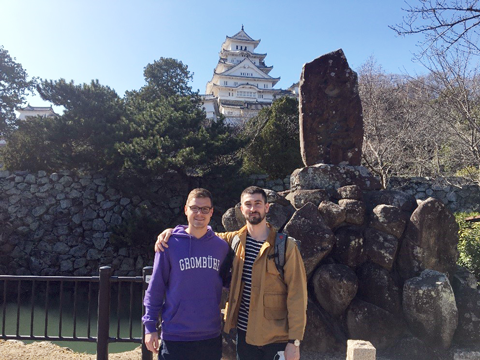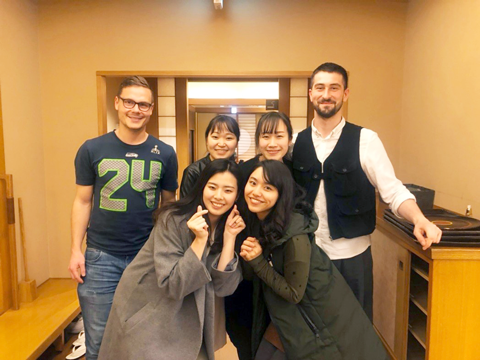国際・国内交流
David Klinkさん(ドイツ・ビュルツブルグ大学 第6学年次)
Student exchange between Hyogo College of Medicine, Japan and Julius-Maximilians-Universitaet, Würzburg, Germany
Preparation
Two months before the start of the internship I heard of my colleague Peter that the girl who was supposed to go to Hyogo with him, had cancelled her internship and so I quickly asked Miss Moll and Miss Torii and luckily got accepted right away. Due to the Covid-19-pandemic we had some difficulties at the start (and at the end, which I will explain later) because our flight would have stopped in China and we had to cancel it and book a non-stop-flight from Munich to Osaka instead.
Due to exams and for my part little time I wasn’t able to learn a lot of Japanese ahead of the exchange except Kanas (Hiragana and Katakana, I studied them with videos on youtube). With this insufficient preparation I wasn’t able to understand conversations in Japanese, but it already helped me read some signs and not feel completely foreign. Also it was a good base from which I was able to start studying Japanese everyday a little more. Still, Japanese is a very different language and therefore it is very tough to learn for Westerners / Europeans. But every word can already help, and Japanese people that you will meet in the hospital or in bars/restaurants will be happy about every single word you can speak. With English we were able to get along fine most of the time, even though spoken English can be difficult for many Japanese people.
The person who organizes all the exchanges at Hyogo College of Medicine is Miss Torii. She is very nice and very very helpful. Due to the spontaneous cancellation of my colleague there were a few things that were important for her (mainly that we’d arrive at the same time with the same flight) – but when we arrived, we got to know why: we got collected by a taxi from the airport and drove for an hour to our residence at the hospital, where Kyoko took the whole morning to show us around in the hospital. In addition, she was always the greatest help for us and we could always come to her, if we needed anything and we are incredibly thankful for all her help.
Our residence was provided by the hospital (the Guest house) and we received two mobile phones (one for calls in the hospital and a normal Japanese phone). Additionally, we received meal tickets for lunch in the hospital canteen.
Our accommodation was located about 50 meters from the main building of the hospital, also there was a huge supermarket (Trial) around 100m away and in about 7 minutes by foot one could get to the train station Mukogawa and either take a train to Osaka/Kyoto or to Kobe to explore the region.
Transportation
Speaking of trains in Japan, it is very common to travel with the train. Be it short break or driving to work every day, you don’t get around driving with the train in Japan (except if you already live directly next to the hospital like us). Therefore, we already purchased Japan-Railway-Passes ahead from Germany, because they can only be bought from outside of Japan. There are different offers, we decided to choose three different tickets (one 14-day-JR-pass for all Japan for travelling after the internship, two 3-day-JR-passes for the (small) Kansai area (until Kyoto) and one 5-day-JR-pass for the Kansai Wide Area). The Area Passes were great for weekends or also in the afternoon, if one was able to go home earlier and wanted to go to Osaka, Kobe or Kyoto. But there aren’t only JR-lines, but also e.g. Hanshin and Hankyu-lines in our area, which are privately owned and the JR-passes are not valid there. Same with busses, so one should be informed ahead for which line one can take with the JR-pass. All in all, travelling with trains in Japan can be a little complicated due to the different companies, but after all very relaxed and especially in the Kansai Area very cheap (all the other area passes were a lot more expensive than in Kansai). Due to Covid-19, we weren’t able to use our 14-day-pass, but were able to give it back at the JR-center in Osaka (good will) and got nearly all the money back we had paid except a service fee, so once again the Japanese are very nice. Once again, JR-passes have to be bought in advance from Germany or wherever you’re from (except Japan).
Working in the hospital
We were able to split our internship into two parts and hence able to get to know two different departments.
I spent my first two weeks in Neurosurgery. Professor Yoshimura was very kind, directly introduced me in the morning meeting and told me to sit next to him, and he could explain the cases to me in person, which were presented by the doctors. Also he made them do the presentations in English, which wasn’t so easy for all of Japanese doctors, as they were used to speak in Japanese in their meetings. I was lucky to have two Nepalese assistant doctors around me who were at the neurosurgical department at the same time as me and who explained a lot of the very interesting operations (e.g. an open-brain surgery at a young patient with Moyamoya-disease). Also we spent a lot of time together, cooking in the evenings, playing guitar or going out to dinner. But also we got to know some Japanese students with whom we spent some of our evenings, so we were blessed to meet a lot of very nice people in our internships. I got more and more included in the morning meetings and had to present some cases of patients, who would be scheduled for operation on the same day. As I wasn’t able to understand the written reports (they were in Japanese writing) other doctors had to explain the cases to me before I was able to present them, so it was more work for them, but they never complained and always answered my questions and were very helpful.
The other two weeks Peter and I spent together at the Intensive Care Unit. The Professor here and all doctors were also very helpful. The morning meeting was held in Japanese, the professor sat next to us and explained the most important details in English. Then, there was the ward round (in Japanese) and then there was a meeting of the microbiologists where we participated, but also relied on translations from the other Professor as the meeting was held in Japanese. We both made presentations about a subject (for me it was delirium). The professor and two doctors of the department went for lunch with us to a German restaurant on our last weekend in Japan, which was very sweet and we really enjoyed it.
Working in the hospital usually starts between 7 and 8 (in my departments always with a morning meeting) and lasts until 3 or 4 in general, depending if we needed to prepare presentations or if there were interesting operations in the department. Generally because of the language barrier and me limited responsibility I took the spectator’s view often, but this wasn’t bad as I saw a lot of interesting operations, still it is quite different from life in the hospital in Germany that one should be aware of.
Free time
Our first evening in Japan was most likely the best start imaginable. We looked for a close by restaurant on google maps and found a small Izakaya (Oke), in which we first had our difficulties ordering in English. Then, a Japanese who spoke fine English came and sat next to us and we started talks about football, manga etc, and got into great conversations in which not only 3 of us, but the whole Izakaya took part in and it became an unforgettable evening at which end one of the mainly Japanese-speaking guests payed for all our expenses. Also during the rest of our stay this overwhelming kind of hospitality occurred to us on various occasions and we once again have to thank everyone involved for the possibility to be part of such a wonderful exchange program!
Free time in the Kansai area can be used in many many different ways. One can practically do everything imaginable, from Second-Hand-shopping or eating-out in Osaka to eating-out in Kobe up to touristic main attractions such as Kyoto (incredibly many and good preserved sights one definitely has to have seen when visiting Japan) and to Himeji, the most famous castle of Japan. The Kansai Area always has something to be stunned by.
But also other than travelling, there are a lot of different things to do, e.g. sports. I played soccer in a Japanese team (FC Nishinomiya), whom I contacted on facebook. I also practiced once with the university-football-team (there is also a Baseball team), but you can also go to a Batting Range. Of course everything is very urbanized, so it isn’t the best place to go running – but also one can go hiking close by in the mountains or relax in one of the onsen and at the same time get to know a huge part of Japanese culture.
Due to Covid-19, nearly all museums were closed, even though in Japan, it seemed to all be going the normal routes (maybe because they were trying to keep up the hopes with the 2020 Olympics in Tokyo by not panicking in front of the pending pandemic, but eventually they also had to postpone that as well). This is why culturally we cannot give that many advices.
An experience of the very special kind we had in Koya-san, when we spent a night in a traditional Buddhist monastery (quite expensive, but worth it). We were able to take part in evening and morning prayer and meditation and could enjoy the traditional vegetarian (what you rarely find in Japan) monk-meals. Another great night, we spent at the walking path of Kumano Kodo and also walked part of the way, which I can definitely recommend. COVID-19
The beginning of pandemic didn’t become noticeable until the end of our internship, when our flights got cancelled one after the other when the cases grew in Europe. We had to cancel our 14-days vacations that we had planned after our internship, so that we could get back home early and safe. As already mentioned, all Japanese were very understanding and pleasant, for example with our JR-pass. Still our experience surely was different to generations before and after us and therefore have to be put in a place regarding the ongoing pandemic.
Getting back from Japan was the biggest (and maybe only) problem we had in Japan. At the end of March we had to book different flights nearly daily, just to cancel them again the next day. In the end, we had to take a KLM-flight instead of the Lufthansa-flight that we originally had booked, to ensure our return to Germany. It was a lot of calling hotlines and very frustrating, as we had to ask our friends and relatives in Germany to do that for us, because the website didn’t work and we would have spent a fortune calling from Japan.
If there are requests or questions, feel free to ask Miss Torii about our email addresses, we will gladly help you with questions regarding our internship at Hyogo College of Medicine and our time in Japan!

